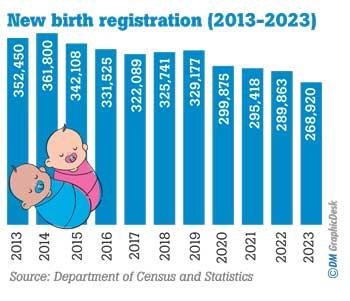16 Jan 2024 - {{hitsCtrl.values.hits}}

Some newlywedded couples argue that love alone is not sufficient to raise children at present and affirm that the economy must support the cause of adding to the population
 The ongoing economic crisis in the country is not only impacting the availability of food, but has also had a significant effect on population growth. This is evident in the fact that the majority of individuals who married in the years 2021-2022-2023 are choosing not to have children, according to data provided by the Department of Census and Statistics. Consequently, compared to previous years, the number of new births has decreased by about 100,000. According to newly married couples, who chose not to have children in 2019 and 2020, the reason was the Covid epidemic. Due to the vaccinations administered to control the epidemic, they had to delay having children based on medical advice.
The ongoing economic crisis in the country is not only impacting the availability of food, but has also had a significant effect on population growth. This is evident in the fact that the majority of individuals who married in the years 2021-2022-2023 are choosing not to have children, according to data provided by the Department of Census and Statistics. Consequently, compared to previous years, the number of new births has decreased by about 100,000. According to newly married couples, who chose not to have children in 2019 and 2020, the reason was the Covid epidemic. Due to the vaccinations administered to control the epidemic, they had to delay having children based on medical advice.
 Even though the COVID epidemic has subsided, newly married couples are showing reluctance to produce children; citing the country’s economic crisis as the reason. They say that raising children in a situation where they cannot afford living expenses adds an unnecessary burden.”We love children, but we choose not to have our own. It’s a personal decision. We entered wedded life getting in to debt and it will take at least six years to pay off the loan we’ve taken. Currently, we are renting a house and our income is insufficient to settle debts and pay for rent, daily necessities and utility bills. Additionally, there are concerns about job security due to ongoing issues at the work place. We’ve decided not to raise a child to prevent jeopardizing their future amid this economic crisis. The financial strain after childbirth-which includes expenses for formula and other necessities-poses a significant challenge. Providing proper education for children under these circumstances is also a concern. This is why we have chosen not to have children,” opined a newly married couple.
Even though the COVID epidemic has subsided, newly married couples are showing reluctance to produce children; citing the country’s economic crisis as the reason. They say that raising children in a situation where they cannot afford living expenses adds an unnecessary burden.”We love children, but we choose not to have our own. It’s a personal decision. We entered wedded life getting in to debt and it will take at least six years to pay off the loan we’ve taken. Currently, we are renting a house and our income is insufficient to settle debts and pay for rent, daily necessities and utility bills. Additionally, there are concerns about job security due to ongoing issues at the work place. We’ve decided not to raise a child to prevent jeopardizing their future amid this economic crisis. The financial strain after childbirth-which includes expenses for formula and other necessities-poses a significant challenge. Providing proper education for children under these circumstances is also a concern. This is why we have chosen not to have children,” opined a newly married couple.
Some argue that love alone is not sufficient to bring children into the world. They emphasise that their children would not receive a proper education in Sri Lanka. “Even families with just one child struggle to make ends meet with their monthly income. The recent increase in VAT has elevated the cost of everything. Additionally, there are limited job opportunities for children who receive education in Sri Lanka. Migration is becoming a common consideration. We do not want our children to endure the hardships that we face, even after obtaining an education. Therefore, we have decided against having children,” aired another couple sharing their views on marriage raising children.
Moreover, many newlyweds and those on the verge of getting married aspire to migrate shortly after registering their marriage due to their inability to confront the economic crisis prevalent in the country. They often opt for a marriage registration and utilise the money allocated for the wedding ceremony to move abroad. In this scenario, one of the partners typically goes abroad first and eventually brings his or her spouse over after some time. The prospect of having children is not a priority in such circumstances as their future depends on the employment opportunities they secure overseas. These individuals also refuse to have children despite getting married.
Another group says that their parents endured hardships on their behalf, and now they find themselves grappling with the country’s economic challenges. As a result, they are refusing to have children because of the possibility that they will have to undergo hardships due to the prevailing economic situation.
Politicians and other authorities seem reluctant to acknowledge the fact that a significant number of newly married couples are refraining from having children. Consequently, certain officials express hesitation in releasing specific reports from the Department of Census and Statistics. A department spokesperson confirmed that this reluctance is solely to prevent the emergence of another issue amid the economic crisis in the country. The spokesperson of the Department of Census and Statistics added that there is a decrease in marriage registrations; indicating a possible halt in marriages due to the ongoing economic challenges. Additionally, it was reported that data has been concealed due to the fear that if such issues surface, especially with this year’s presidential and general elections approaching, it will significantly impact the voter base of those in power.
Decrease in new births
Although the release of the latest data from the Department of Census and Statistics has been delayed, according to birth registration records covering the period July 2012 to June 2023 it appears that the number of new births has decreased by nearly 100,000. From July 2012 to June 2013, 352,450 new births were registered for the year 2013. From July 2013 to June 2014, 361,800 new births were registered for the year 2014. From July 2014 to June 2015, 342,108 new births were registered for the year 2015. From July 2015 to June 2016, 331,525 new births were registered for the year 2016. From July 2016 to June 2017, 322,089 new births were registered for the year 2017. From July 2017 to June 2018, 325,741 new births were registered for the year 2018. From July 2018 to June 2019, 329,177 new births were recorded for the year 2019. From July 2019 to June 2020, 299,875 new births were registered for the year 2020. From July 2020 to June 2021, 295,418 new births were registered for the year 2021. From July 2021 to June 2022, 289,863 new births were registered for the year 2022. From July 2022 to June 2023, 268,920 new births were registered for the year 2023.
Compared to data from 2013, there was a rapid decrease in the registration of new births in Sri Lanka in the year 2023. Compared to 2013, 83,530 new births have decreased in 2023. Compared to 2013, the registration of new births in 2022 has decreased by 62,587. Compared to 2013, the birth registration in 2021 has decreased by 57032.
It is also noteworthy that the majority of newly married individuals who do not have children are Sinhala Buddhists. A Muslim youth, recently married, expressed his views, stating that the Muslim community is also having fewer children due to the current economic crisis. Traditionally, Muslim families used to have about 3-5 children. However, considering the present economic challenges, he mentioned that the number of children in their community has now been limited to 2-3.
According to the latest World Bank data, a family in Sri Lanka has limited the number of children to two. Data obtained from the Family Health Bureau and the Sri Lanka Police indicate that the Child Protection Authority points out that there were 2087 teenage mothers reported in the year 2022 alone. The authority shows that these pregnancies often resulted from instances of rape connected to intimate relationships or other circumstances. That number is associated with 4 percent of the teenagers. The police report also reveals that 1391 individuals who filed complaints of rape in this manner in 2022 became pregnant through consensual sexual activity.
However, these teenagers who got pregnant were between the ages 15-19. Additionally, only one-third of abuses are reported to the Child Protection Authority and the police. A spokeswoman of the Child Protection Authority confirmed that it is widely acknowledged that the actual number of rape cases is seven times higher than those officially reported, even if not formally announced.
Sixteen children with disabilities are born every day in Sri Lanka, as revealed in a 2020 survey conducted by the Department of Health. The survey report also indicates that 5800 children are born with birth defects annually. According to the report, 16 children with birth defects are born every day. Additionally, based on data from the health department, the number of foetuses dying in the womb after 7 months is about 1900. According to a recent report from 2016, the health sector has discovered that 650 illegal abortions are performed every day. The health department reports also state that there are more than 240,000 abortions done during a year.
The reason for this, as pointed out by the health sector, is that young people are increasingly adopting the concept of not getting married and living together. Maintaining that it is difficult to have children in the face of COVID and economic crises, they adopt the concept of unmarried cohabitation. The various drugs and vaccines that these individuals take to prevent pregnancy have led to an increase in the birth of children with birth defects. There is also a rise in abortions. Therefore, a spokesperson from the Department of Health emphasised that te responsible parties should pay attention to this trend.
Commenting on this issue Family Health Bureau Director Dr. Chithramali de Silva stated that there is no significant increase in the rape of teenage girls. “The information we receive is the number of teenagers among pregnant mothers registered with Public Health Midwives. There is no notable increase, and the information covers the entirety of Sri Lanka. In some areas, however, the percentage is higher. Apart from that, there is no significant increase. To assert that newly married people are not having children, we would need to conduct a survey as we currently lack the necessary data for that. However, the registration of new births is lower compared to previous years, and there is a decline in marriages. The COVID epidemic contributed to the decrease in new births,” said Dr. De Silva. She added that data provided by the Department of Census and Statistics suggests that most of the newly married couples are not raising children due to the current economic crisis.
If so, this is another sad situation that this nation has to confront in the face of the economic crisis. This country having a promising generation of children in the future will remain a dream given the present situation in the country. Therefore, Sri Lankans hope that the authorities will swiftly pay attention to all these issues and provide a solid solution.
25 Dec 2024 2 hours ago
25 Dec 2024 3 hours ago
25 Dec 2024 4 hours ago
25 Dec 2024 4 hours ago
25 Dec 2024 5 hours ago